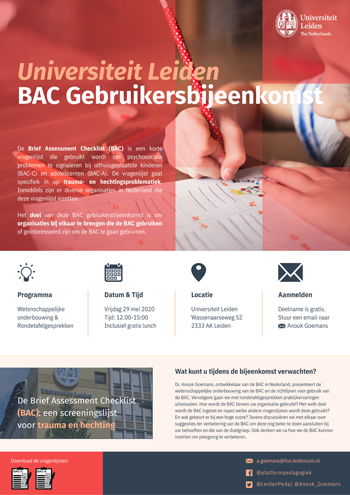
|
block |
March 2020 My colleague Dr Anouk Goemans is hosting a workshop for organizations that use the Brief Assessment Checklists on Friday 29th May at Leiden University, The Netherlands.
The Brief Assessment Checklist for Children (BAC-C) and the Brief Assessment Checklist for Adolescents (BAC-a) are 20-item caregiver-report psychiatric rating scales designed to:
The BAC-C and BAC-A were primarily designed to be used as screening measures. However, they may also be used as brief casework monitoring tools by foster care and adoption agencies, and for treatment monitoring in CAMHS. The BAC-C and BAC-A were derived from the Assessment Checklist for Children (ACC, 120 items) and the Assessment Checklist for Adolescents (ACA, 105 items) respectively. The ACC and ACA instruments measure a broad range of mental health difficulties observed among children and young people in care that are not adequately measured by standard rating instruments, such as the Child Behavior Checklist (CBCL) and the Strengths and Difficulties Questionnaire (SDQ). These consist of: several types of interpersonal, attachment-related difficulties; insecure relating; social, behavioural and emotional dysregulation; trauma-related anxiety and dissociation; abnormal responses to pain; overeating and related food maintenance behaviours; sexual behaviour problems; self-injury; and suicidal behaviours and discourse. Translations Screening accuracy and other psychometric properties Initial research data from the NSW Children in Care Study (CICS) suggest that BAC-C and BAC-A screening accuracy for identifying clinical-level difficulties among children (N=347) and young people (N=230) in care compares favourably with that of existing screening instruments, notably the SDQ and the Brief Problem Monitor (CBCL short form). The BAC-C and BAC-A provide highly accurate screening for clinical range ACC and ACA scores among children and young people in care (area under the curve [AUC] ranging from 0.96 to 0.99), as well as for CBCL clinical range scores (AUC: BAC-C = 0.89 to 0.92; BAC-A = 0.93 to 0.94). They provide moderately accurate screening for children that have clinical-level difficulties, as indicated by their reported use of mental health services (AUCs: BAC-C = 0.74; BAC-A = 0.79). Initial data also suggest the BAC-C/A total scores approximate the CBCL total problem score (a measure of global psychopathology) at least as well as the SDQ total difficulties score. In the CICS, BAC-CBCL total score correlations were 0.82 (BAC-C) and 0.88 (BAC-A), as compared to a mean SDQ-CBCL correlation (averaged across several studies) of 0.76. Internal consistency of BAC-C (N=347) and BAC-A (N=230) scores were 0.89 and 0.87 respectively (for details, see the preprint manuscript below). Download the BAC-C and BAC-A checklists and a Scoring and Interpretation guide Read more about the development and screening accuracy of the Brief Assessment Checklists in the following preprint manuscript: Download the following open access article from the journal website: |
